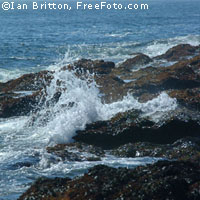Climate change already affecting Europe's seas, says JRC
Climate change is already having a significant impact on Europe's seas and coasts, and any policies designed to mitigate these impacts will also have to address the wider human exploitation of the seas and coasts, according to a new report from the European Commission's Joint Research Centre. The report, 'Marine and Coastal Dimension of Climate Change in Europe: A report to the European Water Directors', was presented at a symposium on climate change and water organised by the German EU Council Presidency. Research shows that climate change is not affecting all European waters equally; while sea temperatures around Scotland have increased by around 1°C in the last 20 years, temperatures in the Mediterranean have gone up by just 0.5°C. Similarly, rates of sea level rise around Europe range from 0.8mm per year to 3mm per year. Meanwhile catastrophic weather events such as downpours, storm surges and floods also appear to be becoming more frequent. Changes in sea level have serious knock on effects on other aspects of the coastal environment, as they interfere with tide behaviour, sea ice conditions and evaporation. Other aspects of the marine environment which are already showing the effects of climate change include circulation patterns and the carbon cycle, with seas becoming more acidic as they absorb more carbon dioxide. Temperature changes have also forced warm-water species northward, and led to a decline in cold-water species. Since the 1960s a sharp fall in the levels of the dominant zooplankton species has lead to changes in the structure of the North Sea's fish assemblages. Combined with over-fishing, this has lead to the almost complete disappearance of the economically important cod population. As this last point shows, human activities such as fisheries, energy production, trade and tourism can work to compound the effects of climate change. On the research front, the report notes that 'there is a need for sustained funding to enable the collection and analysis of long term records to assess and decouple the impacts of climate change from other anthropogenic and natural variability in the oceans and seas, and to build sustainable monitoring and assessment capacities.' More basic research into the impacts of global warming on water acidity, food-web interactions and the carbon cycle is also needed, as is a European marine and coastal observing network providing unrestricted access to real time data. At the global scale, international cooperation with third countries is essential if conflicting situations are to be avoided when implementing mitigation or adaptation plans on marine resources. The report also highlights the need for a mechanism to ensure that data and information arising from research reach decision makers and users of the marine ecosystem. The authors note that all European water-related policies, such as the Water Framework Directive, need to be fully implemented across Europe. 'But most importantly, the European Marine Strategy, as the environmental pillar for the EU Maritime Policy Green Paper, would represent a unique integrated tool for the protection of the marine environment in Europe looking at issues in a holistic way, including present and future climate change impacts,' the report states.



